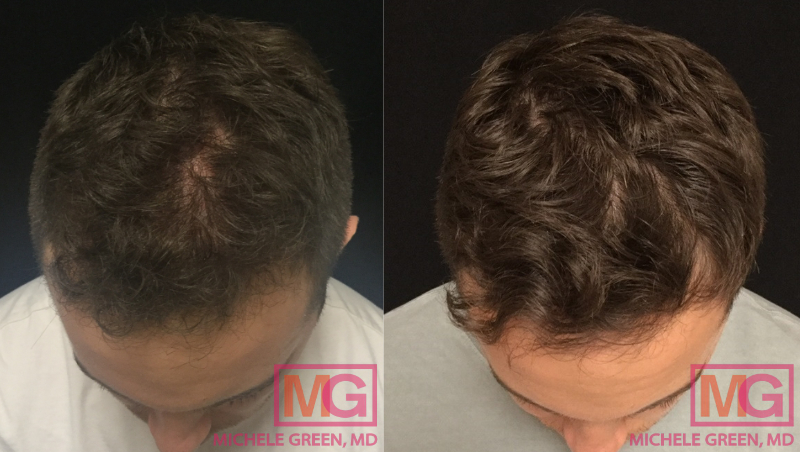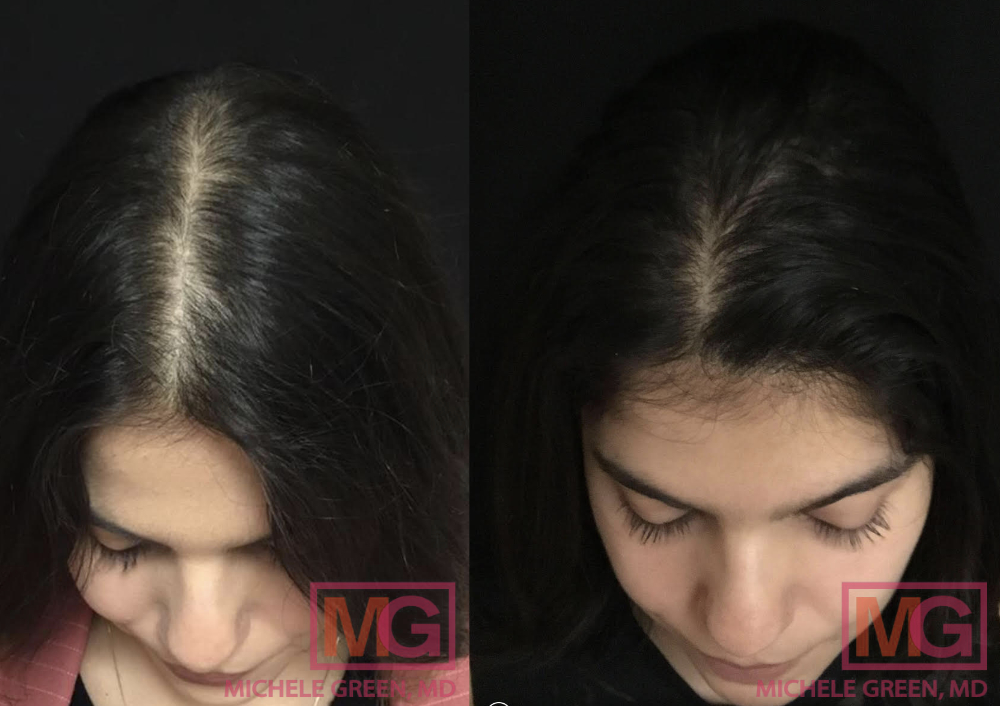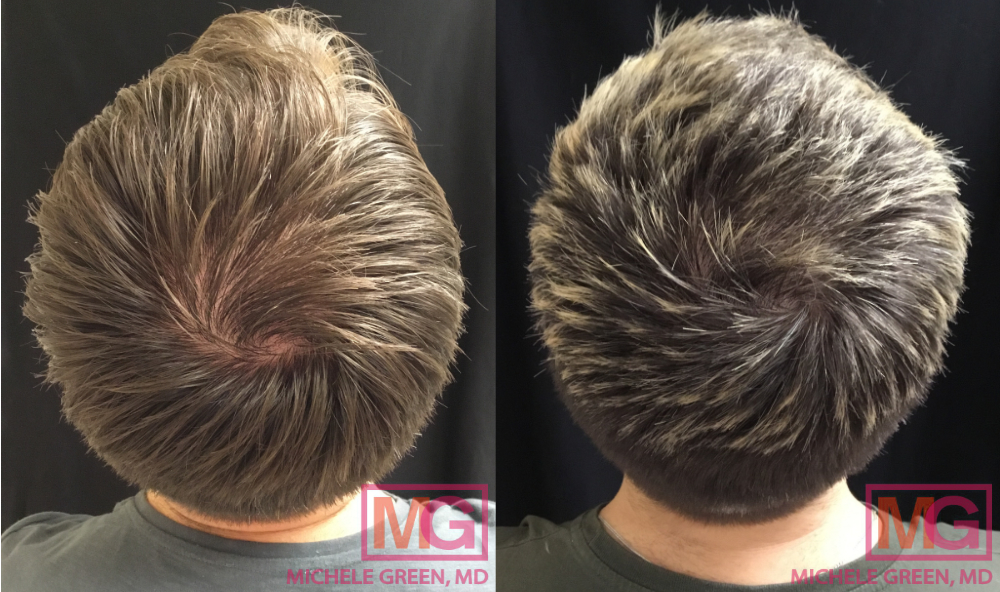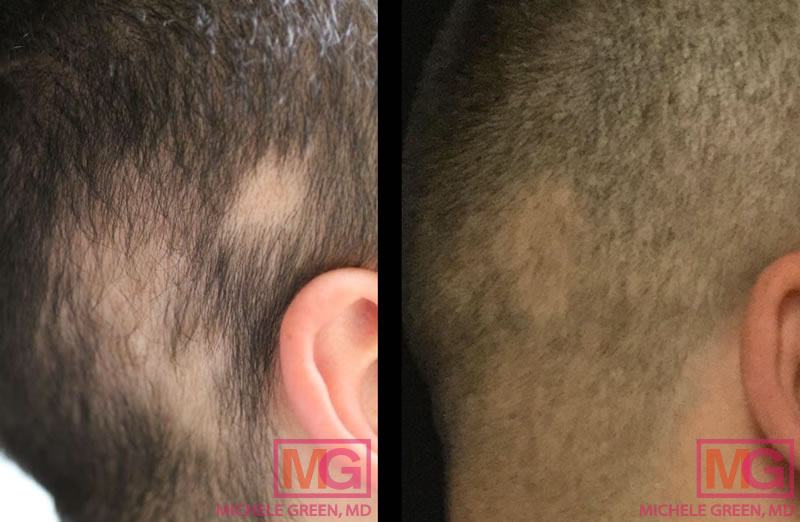Oral Dutasteride for Hair Loss
Hair loss is an issue that can cause enormous stress for both male and female patients. There are many new treatments, products, and supplements available on the market designed to target hair loss, and it can be difficult to navigate without the help of a board-certified medical professional, like Dr. Michele Green in NYC. Finasteride and Minoxidil are currently two of the most popularly prescribed medications for combatting hair loss. Although it is pending approval by the FDA, Dutasteride is a medication that is being evaluated for its potential benefits as a hair loss treatment.
Oral dutasteride is a prescription drug commonly known by its brand name Avodart. It blocks the action of an enzyme called 5-alpha-reductase and is part of a class of medications known as 5-alpha-reductase inhibitors. This class of drugs prevents your body from converting testosterone into an androgen hormone called dihydrotestosterone (DHT) which has been linked to male pattern hair loss. DHT plays a major role in the development of male sex characteristics such as facial and body hair. However, as an adult that is genetically predisposed to baldness, DHT can bind to androgen receptors in your scalp and cause the hair follicles to stop producing new hair. This ultimately results in loss of hair around your crown (top of head), thin hair, and a receding hairline. Recent studies indicate the promising effects dutasteride may have in male androgenetic alopecia, the most common type of baldness.
Dr. Green has been at the forefront of the field of dermatology for over 25 years and was one of the first physicians in New York City to incorporate Platelet Rich Plasma (PRP) injections for alopecia into her private practice in the Upper East Side neighborhood of Manhattan. Dr. Green incorporates the latest topical and oral treatments for hair loss, including oral Dutasteride, oral Minoxidil, Spirinolactone, and Finasteride (Propecia). She has specially compounded hair serums to replace and thicken thinning hair and hair loss. As an international expert in hair loss and Platelet Rich Plasma (PRP) for alopecia, Dr. Green is always looking for ways to improve the treatment of hair loss for her patients. Dr. Michele Green is an internationally renowned dermatologist that is consistently voted as one of New York’s best dermatologists by Castle Connolly, Super Doctors, The New York Times and New York Magazine. During your consultation in her boutique dermatology office, Dr. Green will take the time required to fully understand your experience with hair loss and hair thinning so that your treatment plan consists of the most effective and efficient treatments for your situation.

6 months before and after PRP
What are the side effects of dutasteride?
The side effects of dutasteride are comparable to the side effects of finasteride. Side effects to both medications are rare. However, the most common side effects that may require medical attention include chills, cold sweats, and faintness or dizziness when getting up from a lying or sitting position. Other less common adverse effects may include bloating, swelling, and unusual weight gain or loss. Dutasteride may cause a severe allergic reaction in some individuals, resulting in a rash and swelling of the face, tongue, or throat. It may also be associated with an increase risk of high-grade prostate cancer. Other side effects have been reported such as a decreased sex drive, erectile dysfunction, and ejaculation disorder. Rare side effects include unusual drowsiness, back pain, headache, and stomach ache.
Young women who may be pregnant should not be exposed to dutasteride. Dutasteride has serious side effects on pregnant women and can lead to severe defects in the fetus. As such, women should not handle dutasteride as it can also be absorbed into their skin and may harm an unborn baby. Dutasteride should never be used in breastfeeding women or in children as the effects are unknown. In addition, men who have been taking this medicine should not donate blood until 6 months have passed since the last dose as the blood may be used on a pregnant woman.
Dutasteride may also have adverse supplement and drug interactions and may not be suitable for all people, such as those with severe bladder problems or liver disease. Those who take cimetidine, diltiazem, ritonavir, verapamil, and ketoconazole, among other medications with dutasteride may have increased risk of side effects. Dutasteride may also affect results of the prostate-specific antigen (PSA) test used to detect prostate cancer. Please consult with an expert healthcare provider such as Dr. Michele Green in New York to get the proper medical advice to know if dutasteride is right for you.

PRP 6 treatments before and after
Is topical finasteride better than oral or topical Dutasteride?
Finasteride was developed in the 1970s and was FDA approved in 1992 to treat BPH and later male pattern hair loss in 1998. Dutasteride is a much newer drug and was approved to treat BPH in 2001 and is yet to be FDA approved for hair loss. Both drugs belong to a class of medications called 5-alpha-reductase inhibitors, or 5-ARIs. 5-ARIs inhibit the conversion of testosterone to the androgen dihydrotestosterone (DHT), which is the primary cause of male pattern baldness.
The main difference between finasteride and dutasteride is that finasteride is selective for 5AR type II while dutasteride inhibits both type I and type II. Dutasteride also has a longer half-life of 5 weeks compared to the half-life of 5-6 hours for finasteride. Dutasteride was found to be 3 times more potent than finasteride at inhibiting 5AR type II and 100 times better at inhibiting 5AR type I. One reason may be because dutasteride blocks 90% of DHT compared to 70% by finasteride, indicating that oral dutasteride may be more efficacious than topical and oral finasteride. However, topical finasteride may be beneficial if you have taken oral finasteride and experienced adverse side effects. Topical finasteride is applied directly to the scalp, which may lower systemic side effects like sexual dysfunction.
Dutasteride is only available in one dosage form: liquid-filled capsules to treat BPH. There has been interest in the idea of topical dutasteride, but there are currently no studies published regarding its effectiveness.
How can I get Dutasteride for hair loss?
Traditionally, oral dutasteride has been prescribed for management of symptoms associated with benign prostatic hyperplasia, or BPH. The condition that affects men is also known as enlarged prostate, which compresses the bladder. BPH can cause urinary retention and an inability to empty the bladder completely. Dutasteride helps relieve these symptoms by preventing the conversion of testosterone into dihydrotestosterone, which causes prostate enlargement, ultimately reducing prostate gland size. New studies have shown that dutasteride is effective in treating male pattern baldness and may even be more effective than finasteride (brand name Propecia) and minoxidil (brand name Rogaine), two of the most popular medications that are currently recommended to treat patients with male pattern baldness. Dutasteride is currently pending FDA approval to treat male pattern baldness.
Despite producing promising results in clinical studies for treating hair loss, dutasteride has not yet been approved by the FDA as a hair loss treatment. Currently, the medications that are available on the market for managing male pattern baldness are limited to finasteride (Propecia) and minoxidil (Rogaine). A board-certified dermatologist, however, such as Dr. Michele Green in NYC, may prescribe oral dutasteride for “off label” use if it is determined to be medically appropriate for a patient. If you are struggling with hair loss or hair thinning and are interested in the various prescription medications, natural supplements, in-office treatments, and medical devices that are available for targeting hair loss, schedule a consultation with Dr. Green in New York. Dr. Green is an internationally renowned dermatologist that is consistently voted as one of NYC’s best physicians by Castle Connolly, Super Doctors, and New York Magazine. During your consultation in her boutique dermatology office, Dr. Green will take the time required to fully understand your experience with hair loss and hair thinning so that your treatment plan consists of the most effective and efficient treatments for your situation.
How long does it take for Dutasteride to work?
It generally takes at least three months of taking dutasteride to observe any initial results, though it can take up to six months to begin seeing any effects depending on the individual. Most of the current studies are limited to 6 months, but the results have shown that dutasteride effectively increases hair growth and restoration in men with androgenetic alopecia. The effects of dutasteride last only for as long as the patient takes the medication. Once a patient discontinues use of dutasteride, hair loss and hair shedding symptoms may resume. When you work with Dr. Michele Green in New York City, she will help you develop a customized treatment plan that addresses your specific concerns and promotes healthy hair growth and retention that lasts.
How much does Dutasteride cost?
Dutasteride is not yet authorized by the FDA to treat hair loss, but can be prescribed for off-label use by a medical provider. The cost of the prescription may vary drastically depending on your healthcare coverage, the pharmacy you go to, your geographic location, and whether the generic version or the brand name is readily available in your area. The best way to determine what the total cost of your medication would be is to contact your individual health insurance plan and determine the type of coverage that they offer.
Does Dutasteride increase estrogen levels?
Dutasteride works against hair loss by inhibiting the conversion of testosterone to dihydrotestosterone (DHT). The result is that dutasteride increases both estrogen and testosterone levels, but the increases that occur are within normal physiologic range. An increase in estrogen levels after taking dutasteride should not be of major concern as adverse reactions are highly unlikely. When you consult with Dr. Green at her private dermatology office in the Upper East Side neighborhood of Manhattan, she will examine the extent of the hair loss and discuss with you in-depth regarding your medical history. Additionally, Dr. Green will review the results of any lab work that has been done within a year of your consult. If you do not have any recent bloodwork, lab tests may be ordered to determine as to whether any hormonal imbalances are contributing to your hair loss or hair shedding. Depending on the results of your consultation, Dr. Green will recommend a unique combination of medications, treatments, and procedures that is best suited to your condition and leaves you with thicker, healthier hair that lasts.

Male patient treated for hair loss with PRP – 6 months
How does oral Dutasteride compare to oral minoxidil?
In comparative studies, oral dutasteride outperforms every other male hair loss treatment and is more efficacious when it comes to treating androgenetic alopecia than oral minoxidil is. A study by JAMA Dermatology did a meta-analysis of 23 trials analyzing the efficacy of orally and topically administered minoxidil, dutasteride, and finasteride. The conclusion was that dutasteride had the highest probability of being the most efficacious treatment. 0.5mg/d of oral dutasteride was the best performer to treat male pattern baldness. Dutasteride was followed by 5mg per day of oral finasteride , followed by 5mg per day of oral minoxidil (Rogaine). The next best performing medication was a 1mg dosage of oral finasteride, followed by 5% topical minoxidil, 2% topical minoxidil, and lastly 0.25mg per day of oral minoxidil.
Every patient that presents with hair loss and hair thinning requires a personalized treatment approach to ensure that their plan is catered to the underlying factors causing their condition. The unique combination of treatments that works best for one patient may not be as beneficial for another. The benefit of working with a board-certified dermatologist, like Dr. Michele Green in NYC, is that you have an expert in the field to advise on the medications and treatments that are best suited to your situation. When you consult with Dr. Green at her private dermatology office in the Upper East Side neighborhood of Manhattan, she will collect a thorough medical history and physically evaluate your hair loss. Lab tests may be ordered to better understand the factors contributing to your hair loss and hair thinning. Based upon the discussion and findings, you will be recommended the treatments, medications, and procedures that will best help you grow and retain hair.
Oral Dutasteride for hair growth
Dutasteride-Tamsulosin or dutasteride have been historically prescribed as 0.5 mg capsule/day for management of symptoms of bph and enlarged prostate. In clinical trials, oral dutasteride capsules have been successful in reducing hair loss and promoting new hair growth. When compared to oral and topical finasteride, the current leading medications for combatting hair loss, research has shown that oral dutasteride is a more efficacious treatment for patients with androgenetic alopecia- one of the most common types of hair loss. In one study, ninety men with androgenetic alopecia were randomly assigned to either a finasteride or a dutasteride group. Men between 18 and 40 years of age either received 0.5mg dutasteride or 1mg finasteride daily for 24 weeks. Hair counts at the start of the study and at the 24 week follow-up were measured in total hair counts per cm². The baseline for the dutasteride group was 223 and was 246 after 24 weeks, while the baseline for the finasteride group was 227 and 231 after 24 weeks. There was significantly more hair growth with the use of dutasteride as compared to finasteride.
In another study by the American Academy of Dermatology, 917 men aged 20 to 50 with androgenetic alopecia were randomized to receive either dutasteride (0.02, 0.1, or 0.5mg/d), finasteride (1mg/d), or a placebo for 24 weeks. The results from the study are corroborated by recent data released by JAMA Dermatology, which concluded that oral dutasteride outperforms every other male hair loss treatment currently available. Current research indicates the potential for oral dutasteride to be the next big medication to treat male pattern baldness. It is not currently FDA approved but may soon be as more studies are underway. As a globally recognized leader in the field of cosmetic dermatology for over 25 years, Dr. Green will make recommendations for your personalized treatment plan for hair loss based on her evaluation of your condition. Dr. Green will carefully construct a treatment approach that is best suited to addressing your situation and that incorporates the in-office procedures, prescription medications, and topical treatments that will work best for you.
What time of day should you take Dutasteride?
Ultimately there is not a best time of day to take dutasteride for hair loss. Choose a time of day that works best for you whether it be in the morning, evening, or night time, and make sure to consistently take it at that time in order to maximize the effectiveness of the medication. Dutasteride should be taken as a whole capsule daily on a regular basis for at least 3-6 months before seeing any benefits. In the case of a missed dose, do not double dose. Instead, resume your regular routine on the following day. The capsule should not be chewed or crushed. Be sure to store dutasteride at room temperature, away from heat, moisture, and light.
Can dutasteride cause dry mouth?
As with any medication, there are potential side effects. Dry mouth or xerostomia is a common side effect for many different medications, and it is a potential side effect of dutasteride. The patients that do experience this side effect tend to experience a very mild expression of it. Other rare potential side effects include decreased libido, gynecomastia, erectile dysfunction, and mood disorder. Other risk factors for dry mouth include mouth breathing, older age, and certain medical conditions like diabetes. A combination of medications can contribute to dry mouth, from antihistamines to anti-depressants to opioids.
In order to prevent dry mouth, proper dental and oral hygiene is necessary. Be sure to frequently rinse your mouth and use an alcohol-free mouthwash. Staying hydrated and chewing sugarless gum may help increase salivation and provide some relief. Other ways to alleviate dry mouth include using a room humidifier, stopping tobacco use if you smoke, and limiting your caffeine intake. You may also try an over-the-counter saliva substitute like the Biotene Oral Balance. If you experience any side effects while taking dutasteride for hair loss, consult with the prescribing health care professional.

What is it like to have treatment with Dutasteride Microinjections?
Local injections of dutasteride can be used to treat androgenic alopecia in both men and women. The process entails directly injecting the scalp with dutasteride to maximize the effects of the medication at the follicles, optimizing the encouragement of new hair growth and increased retention, without the potential for any systemic side effects. Patients do not need any particular preparation for having dutasteride microinjections performed. There is no downtime associated with the treatment whatsoever, making it possible to schedule a treatment session with ease. One of the greatest benefits is that the treatment need only be repeated 2-3 times in a year due to the longevity of the medication. Dutasteride injections may be performed independently of other treatments such as PRP injections or in conjunction with other topical or oral hair loss treatments.
How do I get started with treating hair loss?
Hair loss can be devastating for men and women alike. If you are suffering from hair loss or hair thinning, the best first step is to meet with a board-certified dermatologist, like Dr. Michele Green in New York City. Dr. Green has over two and a half decades of experience treating men and women from around the world for various types of hair loss, including androgenetic alopecia, and will work with you to develop a personalized treatment plan so you get the best results. Dr. Green is an internationally renowned cosmetic dermatologist and is consistently voted as one of New York’s best physicians by Castle Connolly, New York Magazine, and Super Doctors.
When you consult with Dr. Green at her private dermatology office, located in the Upper East Side neighborhood of Manhattan, you will discuss with her in-depth regarding your medical history, any previous cosmetic treatments you may have had in the past, and your specific concerns and cosmetic goals. Based upon her evaluation, Dr. Green will customize your treatment approach to incorporate the most effective in-office procedures, supplements and prescription medications, and topical treatments for your hair loss or hair thinning, so that you can achieve thicker, healthier, beautiful hair that lasts. To find out more about addressing different types of hair loss with various treatment methods, schedule a consultation with Dr. Green by contacting us online today or calling the NYC based office at 212-535-3088.
 212-535-3088
212-535-3088